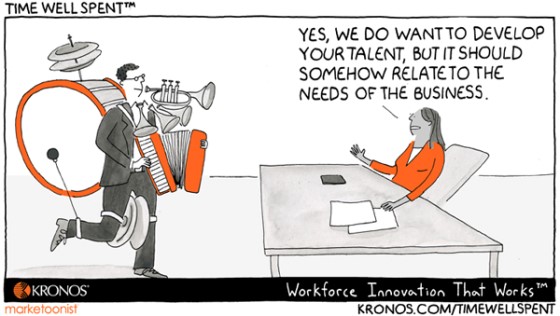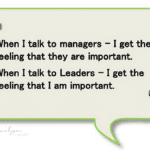(Editor’s Note: Today’s post is brought to you by our friends at Kronos, a leading provider of workforce management and human capital management cloud solutions. The Workforce Institute at Kronos reveals that more than half of the U.S. workforce has experienced a problem with their paychecks in their study “Engaging Employees through Payroll”. Enjoy the post!)
I remember years ago hearing Dan Pink speak at a Society for Human Resource Management (SHRM) Annual Conference about his (then) new book, “A Whole New Mind”. One of the things he talked about was developing a creativity mindset. Specifically, how human resources professionals should expand their thinking and read design and creative journals or magazines to get a different perspective.
That’s why I wanted to share with you this Time Well Spent cartoon from our friends at Kronos. Sometimes organizations need to realize that, when it comes to employee development, the “needs of the business” can be served in more ways than one.
Employees can learn valuable business skills in a variety of ways. I’ve learned a few business lessons playing Fantasy Football, watching television, and even from getting lost driving in Miami. The question becomes, when the company supports what might seem like, on the surface, a totally fun activity, is there a way to bring a business lesson into the conversation so employee development can take place?
One of the hotels I worked at used to create an annual management scavenger hunt. We had several programs for employees and decided to have a dedicated one for managers. The managers looked forward to it every year. Yes, it was fun. But after the fun portion was over, we found a way to tie it to the business. Fun and business aren’t mutually exclusive. I think it’s one of the reasons that gamification is still around.
[clickToTweet tweet=”Fun and business are not mutually exclusive.” quote=”Fun and business are not mutually exclusive.” theme=”style3″]
When we talk about employee development, fun can be part of the mix. In fact, so can music. Just look at Cirrus Logic’s School of Rock. It might take a few minutes to figure out the connection. And there’s nothing wrong with asking employees what they expect to learn. If organizations expand their thinking where employee development is concerned, it’s possible the return-on-investment (ROI) will be significant.
1







